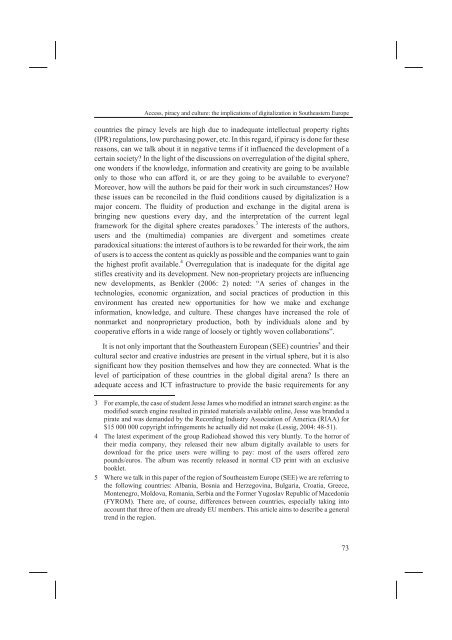D:\Documents and Settings\Ana\My Documents\Biserka-knjiga ...
D:\Documents and Settings\Ana\My Documents\Biserka-knjiga ...
D:\Documents and Settings\Ana\My Documents\Biserka-knjiga ...
Create successful ePaper yourself
Turn your PDF publications into a flip-book with our unique Google optimized e-Paper software.
Access, piracy <strong>and</strong> culture: the implications of digitalization in Southeastern Europe<br />
countries the piracy levels are high due to inadequate intellectual property rights<br />
(IPR) regulations, low purchasing power, etc. In this regard, if piracy is done for these<br />
reasons, can we talk about it in negative terms if it influenced the development of a<br />
certain society? In the light of the discussions on overregulation of the digital sphere,<br />
one wonders if the knowledge, information <strong>and</strong> creativity are going to be available<br />
only to those who can afford it, or are they going to be available to everyone?<br />
Moreover, how will the authors be paid for their work in such circumstances? How<br />
these issues can be reconciled in the fluid conditions caused by digitalization is a<br />
major concern. The fluidity of production <strong>and</strong> exchange in the digital arena is<br />
bringing new questions every day, <strong>and</strong> the interpretation of the current legal<br />
framework for the digital sphere creates paradoxes. 3 The interests of the authors,<br />
users <strong>and</strong> the (multimedia) companies are divergent <strong>and</strong> sometimes create<br />
paradoxical situations: the interest of authors is to be rewarded for their work, the aim<br />
of users is to access the content as quickly as possible <strong>and</strong> the companies want to gain<br />
the highest profit available. 4 Overregulation that is inadequate for the digital age<br />
stifles creativity <strong>and</strong> its development. New non-proprietary projects are influencing<br />
new developments, as Benkler (2006: 2) noted: “A series of changes in the<br />
technologies, economic organization, <strong>and</strong> social practices of production in this<br />
environment has created new opportunities for how we make <strong>and</strong> exchange<br />
information, knowledge, <strong>and</strong> culture. These changes have increased the role of<br />
nonmarket <strong>and</strong> nonproprietary production, both by individuals alone <strong>and</strong> by<br />
cooperative efforts in a wide range of loosely or tightly woven collaborations”.<br />
It is not only important that the Southeastern European (SEE) countries 5 <strong>and</strong> their<br />
cultural sector <strong>and</strong> creative industries are present in the virtual sphere, but it is also<br />
significant how they position themselves <strong>and</strong> how they are connected. What is the<br />
level of participation of these countries in the global digital arena? Is there an<br />
adequate access <strong>and</strong> ICT infrastructure to provide the basic requirements for any<br />
3 For example, the case of student Jesse James who modified an intranet search engine: as the<br />
modified search engine resulted in pirated materials available online, Jesse was br<strong>and</strong>ed a<br />
pirate <strong>and</strong> was dem<strong>and</strong>ed by the Recording Industry Association of America (RIAA) for<br />
$15 000 000 copyright infringements he actually did not make (Lessig, 2004: 48-51).<br />
4 The latest experiment of the group Radiohead showed this very bluntly. To the horror of<br />
their media company, they released their new album digitally available to users for<br />
download for the price users were willing to pay: most of the users offered zero<br />
pounds/euros. The album was recently released in normal CD print with an exclusive<br />
booklet.<br />
5 Where we talk in this paper of the region of Southeastern Europe (SEE) we are referring to<br />
the following countries: Albania, Bosnia <strong>and</strong> Herzegovina, Bulgaria, Croatia, Greece,<br />
Montenegro, Moldova, Romania, Serbia <strong>and</strong> the Former Yugoslav Republic of Macedonia<br />
(FYROM). There are, of course, differences between countries, especially taking into<br />
account that three of them are already EU members. This article aims to describe a general<br />
trend in the region.<br />
73



